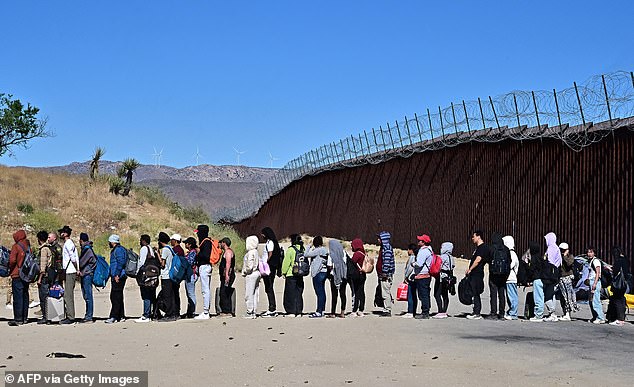Justin Trudeau calls Trump just two hours after president-elect threatens devastating sanctions against Canada, Mexico and China to stop border invasion
- Follow DailyMail.com's politics live blog for all the latest news and updates
Canadian Prime Minister Justin Trudeau was reportedly quick to respond to US President-elect Donald Trump's threat to impose tariffs on Mexican, Canadian and Chinese goods as global currencies plummeted.
The incoming president posted on his Truth Social platform Monday night that he would impose a 25 percent tariff on Mexican and Canadian goods as long as the countries continue to allow immigrants to flow over the US border.
He also said he'd impose an additional 10 percent tariff on Chinese goods over the Chinese government's refusal to make good on a promise to use the death penalty on drug dealers.
These actions, Trump said, would take place on the first day of his administration and noted that the tariffs on Mexican and Canadian imports would apply to 'ALL products coming into the United States, and its ridiculous Open Borders.
'This Tariff will remain in effect until such time as Drugs, in particular Fentanyl, and all Illegal Aliens stop this Invasion of our Country!'
Trump also suggested that Mexico and Canada had 'the absolute right and power to easily solve this long simmering problem' - indicating he wanted the neighbors to do more to patrol their borders so migrants couldn't sneak into the United States amid yet another migrant caravan.
Just two hours after Trump posted the threats, Trudeau called Trump at his Mar-a-Lago estate, and the two had a constructive conversation focused on trade and security at the border, an unidentified Canadian official with knowledge of the call told the New York Times.
The Canadian government then released a statement focusing on the deep ties between the US and Canadian economies.

Justin Trudeau called President-elect Donald Trump just two hours after he threatened to impose tariffs on Canada Monday night

Former President Donald Trump is photographed standing in front of the border wall in August during his reelection bid. The now president-elect has vowed to slap a 25 percent tariff on Mexico and Canada, suggesting they should be the ones to curb border crossings
'Canada is essential to US domestic energy supply and last year 60 percent of US crude oil imports originated in Canada,' read the statement issued by Trudeau, finance minister Chrystia Freeland and public safety minister Dominic LeBlanc.
'We will of course continue to discuss these issues with the incoming administration.'
Flavio Volpe, the president of Automotive Parts Manufacturers' Association - a Canadian industry group - also said he believed Trump's posts were just a way to open negotiations that would eventually solidify Canada and the US as allies in a fight against China.
'Half of the cars made in China are made by American companies and half of the parts that go into all the cars made in Canada come from US suppliers, and more than half of the raw materials are from US sources,' Volpe noted.
'We are beyond partners. We are almost as inseparable as family.'
Ontario Premier Doug Ford added in a post on social media that 'a 25 percent tariff would be devastating to workers and jobs in both Canada and the US.
'The federal government needs to take the situation at our border seriously,' he said. 'We need a Team Canada approach and response - and we need it now.
'Prime Minister Trudeau must call an urgent meeting with all premiers,' he suggested.

Canadian officials have touted the strong economic relationship between the US and Canada
Meanwhile, Mexican officials have not yet commented on Trump's threat.
But they have previously signaled they were prepared to respond with retaliatory tariffs of their own.
'If you put 25 percent tariffs on me, I have to react with tariffs,' Marcelo Ebrard, Mexico's economy minister, told a radio interviewer earlier this month.
Mexico, China and Canada account for more than one-third of the goods and services both imported and exported by the US, supporting tens of millions of American jobs.
The three countries together also purchased more than $1trillion of US exports and provided nearly $1.5trillion of goods and services to the US in 2023.
Issuing a 25 percent tariff on Canada and Mexico would also violate the United States-Mexico-Canada Agreement Trump himself signed in 2020, causing some to wonder if Trump's posts were just a negotiation tactic.
As such, the Chinese embassy in Washington DC warned that 'no one will win a trade war' as it hit out at Trump's claims that the deadly drug fentanyl was still seeping into the US from China.
'The Chinese side has notified the US side of the progress made in US-related law enforcement operations against narcotics,' said Liu Pengyu, a spokesman for the Chinese embassy in DC, The Guardian reports.
'All these prove that the idea of China knowingly allowing fentanyl precursors to flow into the United States runs completely counter to facts and reality.
'China believes that China-US economic and trade cooperation is mutually beneficial.'

Trump suggested the tariffs would continue to remain in effect as long as Mexico and Canada continue to allow immigrants to flow over the US border
But the announcement of the tariffs have already caused the Chinese Yuan to fall against the US dollar to its weakest point in nearly four months, dropping 0.3 percent on the news to 7.2730 per dollar.
Mexican and Canadian currencies also tumbled around one percent each, while the US dollar gained against everything but the yen in Asian trading.
'Risk sentiment is getting crushed for now on Trump's tariff risks - the dollar is being viewed as a haven and the affected nations' currencies like the Mexican peso are getting hammered,' Mingze Wu, currency trader at StoneX Financial told Bloomberg.
'This may just be a taste of what's to come.'



























































































































































































































































































































